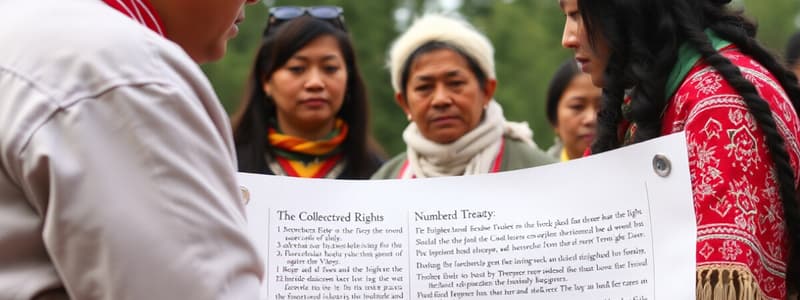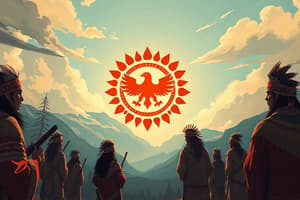Podcast
Questions and Answers
What was one outcome of the Northwest Resistance led by Louis Riel?
What was one outcome of the Northwest Resistance led by Louis Riel?
- Louis Riel was executed for treason (correct)
- Métis people gained full voting rights immediately
- A successful acquisition of land for the Métis
- The establishment of peace between Métis and the Canadian government
What significant role did the Royal Proclamation of 1763 play for First Nations?
What significant role did the Royal Proclamation of 1763 play for First Nations?
- It divided land and established modern-day provinces
- It provided First Nations with the right to govern themselves
- It abolished all treaties involving First Nations
- It recognized First Nations rights to land west of the Appalachian mountains (correct)
What was the primary purpose of Bill 101 in Quebec?
What was the primary purpose of Bill 101 in Quebec?
- To limit French media in the province
- To establish English as the primary language of commerce
- To grant legal rights for bilingual education
- To promote the French language and culture (correct)
Which of the following accurately describes Métis people?
Which of the following accurately describes Métis people?
Which provinces in Canada are associated with the Numbered Treaties?
Which provinces in Canada are associated with the Numbered Treaties?
Which groups are recognized as having collective rights in Canada?
Which groups are recognized as having collective rights in Canada?
What was a primary purpose of the Number Treaties?
What was a primary purpose of the Number Treaties?
What does the term 'autonomy' refer to in the context of collective rights?
What does the term 'autonomy' refer to in the context of collective rights?
What is the focus of the Indian Act?
What is the focus of the Indian Act?
Which of the following benefits is typically received by Indigenous peoples from the Number Treaties?
Which of the following benefits is typically received by Indigenous peoples from the Number Treaties?
What does 'ethnocentrism' imply in understanding cultural perspectives?
What does 'ethnocentrism' imply in understanding cultural perspectives?
Who was Louis Riel?
Who was Louis Riel?
Which type of rights are considered 'inherent rights'?
Which type of rights are considered 'inherent rights'?
Flashcards
What is Scrip?
What is Scrip?
A document issued to the Métis during the negotiation of Numbered Treaties, which could be exchanged for land.
What was the Manitoba Act?
What was the Manitoba Act?
The act recognized Manitoba as a province with two official languages - English and French. It provided educational rights for Catholics and Protestants, and land rights for the Métis people.
What is Bill 101?
What is Bill 101?
Quebec's Bill 101 was created to protect and promote the French language within the province. It initially mandated the use of French in commercial settings and schooling, with some changes after the Charter.
Why is the Royal Proclamation of 1763 important to First Nations?
Why is the Royal Proclamation of 1763 important to First Nations?
Signup and view all the flashcards
Who were the Métis?
Who were the Métis?
Signup and view all the flashcards
Collective Rights
Collective Rights
Signup and view all the flashcards
Numbered Treaties
Numbered Treaties
Signup and view all the flashcards
Reserve
Reserve
Signup and view all the flashcards
Autonomy
Autonomy
Signup and view all the flashcards
Indian Act
Indian Act
Signup and view all the flashcards
Francophone
Francophone
Signup and view all the flashcards
Anglophone
Anglophone
Signup and view all the flashcards
Inherent Rights
Inherent Rights
Signup and view all the flashcards
Study Notes
Collective Rights in Canada
-
Who receives them?
- Aboriginal Groups (First Nations, Métis, Inuit)
- Official Language Groups (Anglophones and Francophones)
-
What are they?
- Rights guaranteed to specific groups in Canadian society, based on historical and constitutional reasons.
Numbered Treaties
-
Why were they signed?
- Indigenous peoples and the Canadian government signed treaties. Indigenous groups often did not understand the treaties.
-
Who receives them?
- Both the Canadian government and Indigenous peoples received things from the treaties
-
What do they receive?
- Examples include:
- Large areas of Indigenous land for settlement and resources.
- Benefits like education and annuities (yearly payments).
- Reserves for specific lands
- Examples include:
Other Key Concepts
-
Reserve: Land for the exclusive use of First Nations.
-
Autonomy: Authority to make decisions.
-
Indian Act: Federal legislation related to the rights and status of First Nations peoples.
-
Francophone: A person whose first language is French.
-
Anglophone: A person whose first language is English.
-
Inherent Rights: Rights stemming from fundamental justice.
-
Publicly Funded: Services paid for by taxes and provided by the government.
-
Privately Funded: Services paid for by non-government sources.
-
Assimilation: Becoming part of a different cultural group.
-
Official Language Minority: A group that speaks one of Canada's official languages (English or French) and doesn't make up the majority of a province or territory's population
Additional Concepts
-
Ethnocentrism: The belief that one's culture is superior to all others.
-
Louis Riel: A Métis leader significant in the Red River and Northwest Resistance, fighting for Métis rights.
-
Royal Proclamation of 1763: A statement about land division after the Seven Years War. This proclamation is important to First Nations because it acknowledged their land rights.
Bill 101
-
What was it? Legislation created to protect and promote the French language in Quebec.
-
Key Aspects:
- Before the Charter: Commercial use was only in French. After: Could use English and French.
- Before the Charter: Required to attend Francophone schools. After: Includes minority language schools.
Treaty Information
-
Treaty 6, 7, and 8: Major treaties relevant to Alberta.
-
Other Treaties: Treaties 4 and 10 are also part of the Alberta area.
-
Scrip: Documents in Métis history that could be exchanged for land.
-
Treaty Provinces: Examples of provinces in Canada who have concluded treaties include: Alberta, Saskatchewan, Manitoba, and Ontario.
Studying That Suits You
Use AI to generate personalized quizzes and flashcards to suit your learning preferences.




